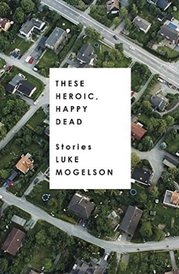A WRITER'S WIT |
MY BOOK WORLD

Dead. New York: Tim Duggan, 2016.
Each story in this powerful collection falls in line with a long tradition of narratives about war: Ernest Hemingway’s A Farewell to Arms, Joseph Heller’s Catch-22, and Tim O’Brien’s The Things They Carried. And there are scores of others, of course, but each of these three epitomize the three major wars of the twentieth century. What Mogelson does is to examine the PTSD-driven lives of soldiers who return from this century’s wars in Iraq and Afghanistan. Two of these stories first came to my attention in The New Yorker magazine, and I was stunned at their honesty, clarity, and integrity. Mogelson writes without either judgment or adulation; instead, the characters just are, alive on the page.
“Total Solar” is one of those stories I want both to speed by and yet s-t-r-e-t-c-h, never end, at the same time. An American in Afghanistan narrates his tale about time spent there as a journalist. There is so much to be said for authors who travel, particularly journalists: they never want for subject matter. Mogelson repeats a number of motifs from his Kabulian stew: the brown sky, dogs with tumors the size of cantaloupes, birds, elevated particulates of fecal matter in the air, and people talking on phones about those whom they might assassinate. The story has a Paul Bowles feel to it, except that the narrator is nearly suicidal over his visit to the region, whereas Bowles is perhaps more sympathetic in his day (his The Sheltering Sky is published in 1949). After all, the narrator is in the middle of a war. He watches as a woman with whom he is acquainted stops to care for a child the narrator knows is faking illness as a lure. She is shot and killed: “That was the end of Sue Kwan,” (173), he thinks, quickly distancing himself emotionally from the event. He portrays himself as nearly a buffoon, one of his CNN pieces having been YouTubed into oblivion for its comic qualities. Finally, he himself is shot, and he momentarily escapes up a mountain, where the air is much clearer. The man he believes is helping him later turns him into authorities, who show up and interrogate him. The story’s ending echoes the telephone motif, as the narrator overhears the planning of someone’s demise:
“That’s when I saw the man talking on his cell phone.
‘No, no one is with him, I can easily grab him,’ the man was saying.
Or was he? I didn’t know. I still don’t” (184).
Don't worry that this book isn't a novel. Each story reads like a battle from the wars that these heroes have fought—both outer and inner. Buy it.
NEXT TIME: New Yorker Fiction 2017


 RSS Feed
RSS Feed